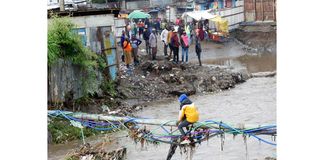El Nino rains: Health ministry’s preparations

(File) Residents watch as a man risks his life to cross a flooded Ngong River, after the Kayaba/Hazina bridge in South B, Starehe sub-county, Nairobi, was flooded by rainwaters on March 23, 2023.
The Kenya Meteorological Department has asked the Ministry of Health (MoH) to remain vigilant as the heavy rains associated with El Niño can cause numerous public health concerns, including the spread of waterborne and vector-borne diseases such as cholera and malaria.
According to Ms Hannah Kimani, assistant director of sub-seasonal to seasonal forecasting at the Meteorological Department, low-lying areas in the north-eastern and north-western parts of the country, as well as the south-eastern lowlands and the Lake Victoria basin are likely to experience flooding.
In 1997, El Niño rains caused landslides, destroyed property and led to the spread of diseases such as cholera, malaria and typhoid and made it difficult for Kenyans to access health care.
The Meteorological Department is working with the Health ministry and other stakeholders to prepare for the potential impact on health services.
“The floods will create favourable breeding grounds for disease-carrying insects such as mosquitoes. We have advised the MoH to stockpile anti-malarial drugs, to ensure that Kenyans have access to treated bed nets, and put in place other known preventive measures. We have also asked them to implement water, sanitation and hygiene measures, such as providing water treatment chemicals to those who rely on open water sources,” said Ms Kimani.
Already, MoH has developed a comprehensive disease prevention and surveillance strategy to ensure that health facilities are easily accessible, especially for vulnerable groups such as expectant mothers, children and people with underlying health conditions.
Deputy Director-General of Public Health and Professional Standards Sultani Matendechero said his department is ready to address any health challenges arising from El Niño.
“Due to climate change, one of the most affected sectors is the health sector. Climate change and health are linked,” he said.
He recalled the difficulties faced during the 1997 El Niño, when floods damaged bridges and roads, making it almost impossible for patients to access health services in a timely manner.
He expressed concern for households using pit latrines, saying that floods could lead overflows that could contaminate water sources, leading to water-borne diseases. He reminded Kenyans that the cholera vaccine is available for those at risk.
In April this year, scientists at the Kenya Medical Research Institute discovered an invasive exotic freshwater snail that poses a significant health risk as it can carry a parasite that causes eosinophilic meningitis. El Niño could encourage the spread this snail.
The potential for outbreaks of animal and zoonotic diseases such as Rift Valley Fever is also a concern. However, scientists in the region have raised concerns about the limited surveillance and reporting systems for detecting and responding to zoonotic disease outbreaks.
A recent study by TRAFFIC highlighted how climate change is affecting disease-carrying vectors such as mosquitoes and ticks, potentially expanding their range and increasing disease transmission.
Dr Matendechere said that public warnings have been issued for diseases such as Rift Valley Fever and stressed the importance of rapid response to infections.
MoH has outlined four key strategies to mitigate the public health impact of El Niño.
The first is to engaging local communities to prevent disease outbreaks. Counties will receive alerts and advice on potential disease outbreaks.
The other is hygiene promotion, with emphasis placed on basic hygiene practices such as frequent hand washing, especially after using the toilet and water treatment.
The ministry will also engage in capacity building at county and national levels to ensure sufficient stocks of essential medicines and health commodities.
Lastly, rapid response teams are being prepared to deal with infections that may occur during the rains, with a focus on post-flood recovery and health system rehabilitation.
The ministry’s strategy also includes addressing mental health issues. Climate-related stress and trauma, often referred to as ecological grief or eco-anxiety, can affect mental well-being. The ministry is ready to provide mental health services and support in collaboration with partners such as the Red Cross.
Dr Matendechere said that mental health issues are like other diseases and assured the public that those in need of treatment and psychosocial support would receive it.
Public Health and Professional Standards Principal Secretary Mary Muthoni Muriuki has also announced that the ministry has developed a comprehensive contingency plan focusing on vulnerable areas within the health system, including to strengthening the capacities of health facilities and activating national and county health emergency response centres.





